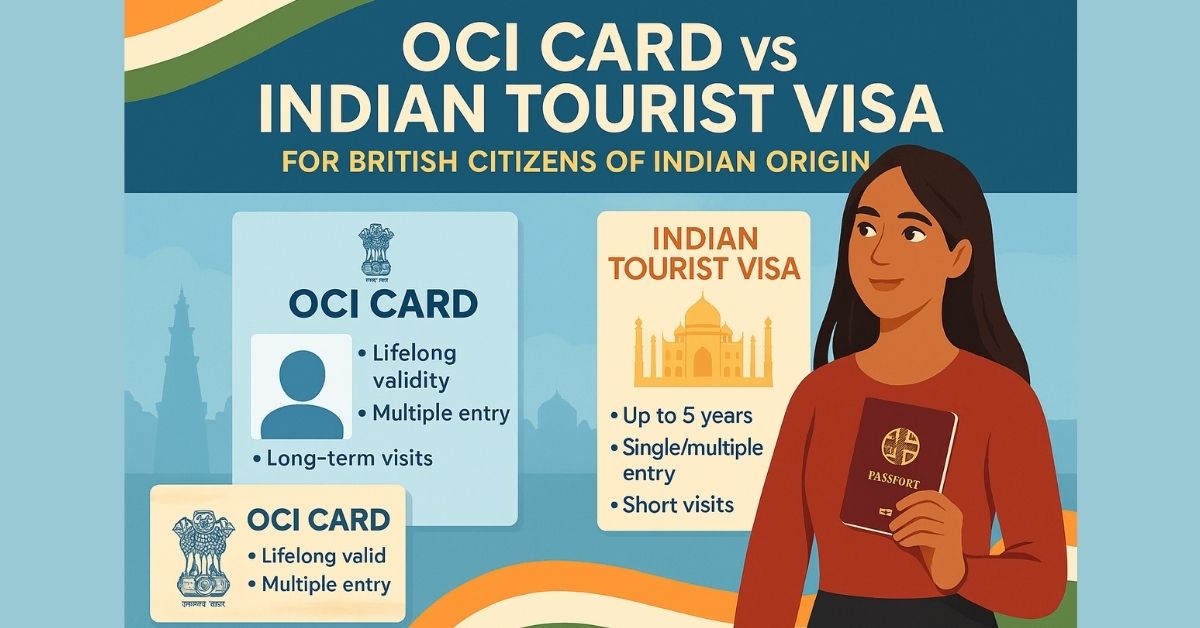Travel Advice for British Citizens of Indian Origin in 2025
If you’re a British citizen of Indian origin, planning a visit to India might raise questions about what kind of visa or travel document you need.The most common terms you’ll hear are OCI, PIO, and Indian Tourist Visa — but what do they mean in 2025?
This blog breaks down the differences, clarifies outdated information, and helps you choose the right option for your travel to India.
First, What Is the PIO Card?
Let’s clear this up quickly: PIO (Person of Indian Origin) cards were officially discontinued in 2015. If you still have a PIO card, it is no longer valid for entry into India. You must convert it into an OCI card to avoid issues at immigration.
To convert your PIO to OCI, visit the OCI Services on VFS Global UK and follow the instructions.
What Is an OCI Card?
OCI stands for Overseas Citizen of India. It is not dual citizenship, but a lifelong visa that allows you to:
- Enter India without a visa
- Stay in India for as long as you want
- Buy property in India (with some restrictions)
- Apply for Indian PAN, Aadhaar, and driver’s licence (in most states)
- Work and study in India
In 2025, OCI cards remain the most powerful travel document for British citizens of Indian origin.
When Should You Use an Indian Tourist Visa?
If you are not eligible for OCI — for example, if your Indian ancestry goes beyond your grandparents or you are visiting purely as a tourist — you can apply for a standard Indian Tourist Visa.
Key points for the Indian e-Tourist Visa in 2025:
- Valid for 30 days, 1 year, or 5 years
- Single or multiple entry depending on the type
- Must leave India before expiry (no extensions)
- Ideal for casual travel, sightseeing, or short family visits
Apply online through the official Indian Visa Portal.
OCI vs Tourist Visa at a Glance
| Feature | OCI Card | Indian Tourist Visa |
|---|---|---|
| Validity | Lifelong | Up to 5 years |
| Entry Type | Multiple Entry | Single or Multiple |
| Purpose | Visit, study, work, own property | Tourism or casual visit |
| Processing Time | 4–8 weeks | Usually within a week |
| Fee | Moderate, one-time | Varies by duration |
Who Can Get an OCI in 2025?
You are eligible for an OCI card if:
- You were previously an Indian citizen, or
- Your parents or grandparents were Indian citizens, or
- You were eligible for PIO status before 2015
You are not eligible if:
- You, your parents, or grandparents ever held Pakistani or Bangladeshi citizenship
- You don’t have documented proof of Indian origin
For more resources on documentation, flights, and travel tips, browse our Travel guides.
What Should You Use in 2025?
- If you visit India once in a while, use an Indian Tourist Visa
- If you travel regularly, or for extended stays, apply for an OCI card
- If you still have a PIO card, convert it immediately to avoid travel issues
In 2025, OCI cards remain the most powerful travel document for British citizens of Indian descent. The PIO is obsolete, and the Tourist Visa works well for casual visits but comes with restrictions. Choosing the right path ensures smooth travel, no immigration hassles, and deeper ties with the country of your roots.
For detailed step-by-step guides on visa applications, head to our Travel & Identity section on ScottishIndian.com.






